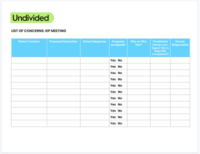IEP Parental Concerns Letter: Pros and Cons
As a parent, you are an integral part of your child’s IEP planning and decision-making team. One way to make sure your input and suggestions are part of your child’s file is by drafting a parental concerns letter that helps clarify what you would like to see addressed at an IEP meeting. This is a chance to share information that only you know about your child.
There are some caveats here, though, which were shared with us by special education advocate and owner of KnowIEPs, Dr. Sarah Pelangka. If you get along well with your child’s IEP team, have built trusting relationships, and your meeting is not likely to be contentious (for example, a basic annual), a parental concerns letter can help expedite the meeting and move things along.
However, if you are in a position where you feel that your district has failed you or your child and you have a number of requests (for example, you want a 1:1 aide or a change in placement), sending the letter ahead of time can allow the district more time to prepare to deny your requests (although predeterminations are illegal, they do happen). By waiting to present your requests until the meeting, you are catching them off guard and can see their reactions in real time. You can also ensure that the discussion is documented and recorded (if you have requested to record the meeting in advance).
If you feel it would be helpful for your upcoming IEP meeting to draft a parental concerns letter, special education attorney Grace Clark tells us what to include and provides some helpful tips.
What to include in a parental concerns letter:
List what you perceive are your child’s areas of need that have and have not been addressed in their IEP, such as social skills, communication skills and/or speech delay, gross or fine motor skills, or academic skills like reading and math fluency.
Highlight your child’s areas of strength and what strategies have been successful at home. This can help the team at school craft accommodations that more accurately fit your child’s needs.
Point out strategies that have not worked and how they might be altered.
If you are working with an advocate or a lawyer, inform the IEP team of this in the letter. If this person will be present at the meeting, include that information as well.
Tips for writing a letter of parent concerns:
Use language that is polite and professional to help keep negotiations respectful.
Let the team know that you will be emailing the letter before the meeting, along with mailing a hard copy to be placed in your child’s file.
Make a list of priorities
Whether you send a letter to your IEP team before the meeting or not, it's important to have your own list of priorities that you want to make sure to cover during the meeting. Listen to Education Advocate Lisa Carey explain her go-to process:
If you're an Undivided member, check out this template to organize your concerns and track how they get addressed in the IEP meeting.
Join for free
Save your favorite resources and access a custom Roadmap.
Get StartedAuthor



